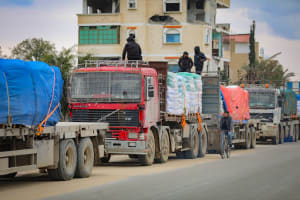NATO's blind spot: Erdoğan's Turkey and the Hamas connection

Turkey's evolution under President Recep Tayyip Erdoğan's leadership presents one of the most concerning paradoxes in modern international relations: a NATO member state actively supporting designated terrorist organizations while facing minimal consequences from its Western allies.
The evidence of Turkey's growing alignment with the Hamas terrorist organization raises serious questions about the international community's willingness to confront this shift.
Turkey's relationship with Hamas has evolved far beyond diplomatic support into what effectively amounts to state sponsorship of a designated terrorist organization. The relationship formally began to take shape after Hamas' 2006 electoral victory.
However, it was in 2011, following an Egyptian-brokered deal that saw Israel release Palestinian prisoners in exchange for IDF soldier Gilad Shalit, that Turkey systematically transformed itself into Hamas' most important base of operations outside of Gaza.
This role became even more crucial after Hamas lost significant regional support following the fall of Egypt's Morsi government. This arrangement has given Hamas unprecedented freedom to conduct activities from Turkish soil, with high-ranking officials operating freely under the explicit protection of Erdoğan's government.
The Turkish government's position on Hamas has become increasingly brazen, with Erdoğan and other senior officials openly rejecting Hamas' designation as a terrorist organization. Instead, they characterize Hamas as a legitimate resistance movement, directly contradicting the position of Turkey's NATO allies.
Turkey's role has become particularly crucial for Hamas following the loss of support from other regional actors, especially after the fall of the Morsi government in Egypt.
Operational infrastructure and support
Turkey's support network operates through sophisticated financial and operational channels. Hamas maintains official representation through Jihad Yaghmour, who was involved in the 1994 kidnapping of IDF soldier Nachshon Waxman.
The Turkish government has established a comprehensive support system through TIKA (Turkish Cooperation and Coordination Agency) and various front organizations. Turkish intelligence (MIT) maintains regular operational contact with Hamas representatives, while Turkish banks facilitate transactions for Hamas-affiliated businesses.
The scale of Turkey's financial support for Hamas is substantial. A 2014 U.S. Treasury Department report identified Turkey as the primary hub for Hamas's financial operations, with annual transactions estimated in the hundreds of millions of dollars. Turkish banks, particularly state-owned institutions, have processed significant Hamas-linked transactions, with some individual transfers exceeding $20 million. Through the Turkish-controlled banking system in Northern Cyprus, Hamas has also established shell companies and front businesses that facilitate sanctions evasion.
The financial infrastructure extends beyond traditional banking. Turkish cryptocurrency exchanges have emerged as key channels for Hamas funding, with blockchain analysis firms identifying substantial fund flows through Turkish-based digital currency platforms.
Additionally, Turkish construction companies operating in Gaza have been identified as conduits for Hamas financing, with several major projects serving as vehicles for fund transfers.
In parallel with these financial operations, Turkey has developed a sophisticated network for Hamas' commercial activities. By 2023, Hamas-affiliated businesses in Turkey included technology companies, real estate investments, and import-export firms, with total assets estimated at over $500 million.
A 2018 Israeli operation revealed direct Hamas recruitment networks operating from Turkish soil, while in July 2023, Erdoğan personally hosted Hamas political chief Ismail Haniyeh, demonstrating Turkey's continued commitment to the relationship even as regional tensions escalated.
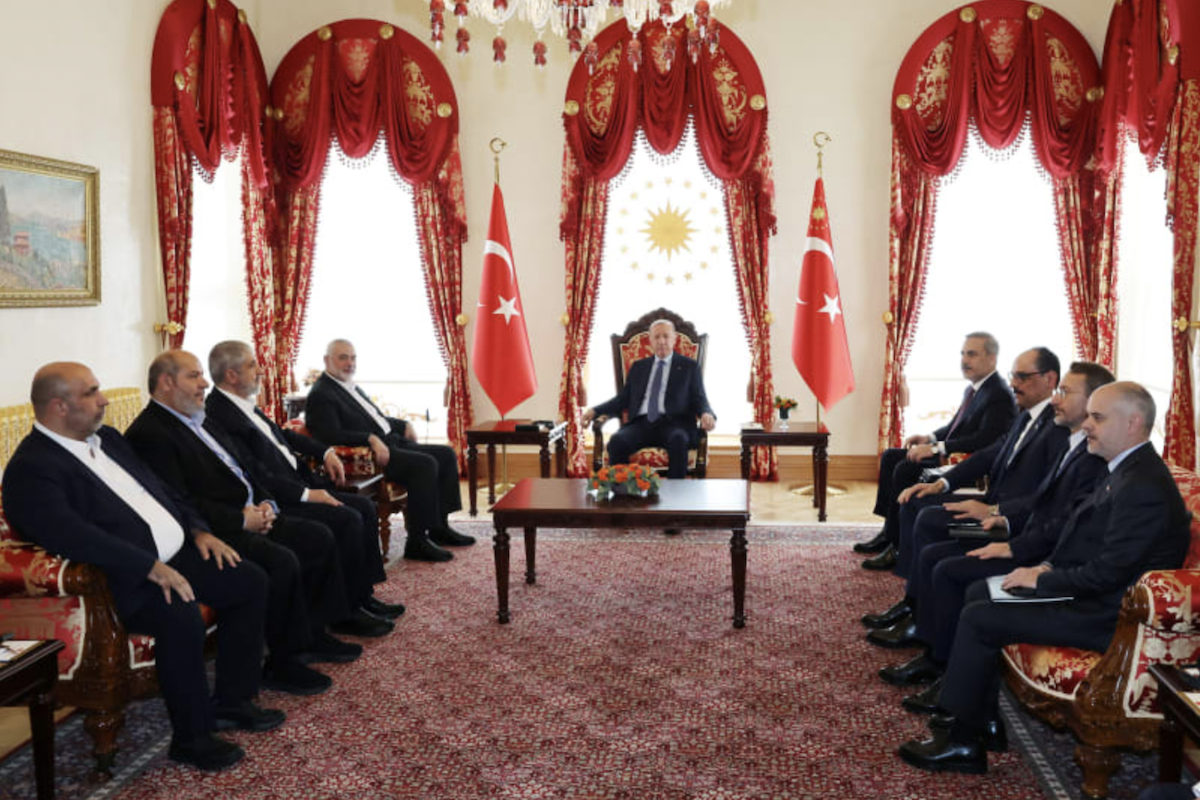
The rise of Islamic identity and Ottoman aspirations
Turkey's embrace of Hamas reflects a deeper transformation within Turkish society. Under Erdoğan's leadership, the country has undergone what scholars call a "Turkish-Islamic synthesis" - a deliberate reintegration of Islamic and Ottoman elements into national identity.
This shift accelerated dramatically after the 2016 coup attempt, which Erdoğan used to purge secular elements from state institutions and accelerate Islamic radicalization.
The transformation is evident across Turkish society. Religious education has become mandatory, with Islamic schools expanding from 450 to over 4,500 in just two decades. Secular universities have been restructured around Islamic principles, while state funding increasingly flows to religious organizations. The Diyanet (Directorate of Religious Affairs) has evolved from a modest department into a powerful institution with a budget exceeding many ministries.
This religious shift aligns with Erdoğan's neo-Ottoman vision. By positioning Turkey as a protector of Islamic causes, including Hamas, Erdoğan seeks to reclaim Turkey's historical role as a leader of the Muslim world. This ambition has found fertile ground in a society increasingly receptive to the fusion of Turkish nationalism with Islamic identity.
Military power and strategic independence
Substantial military capabilities back Turkey's increasing autonomy. As NATO's second-largest military force, Turkey maintains advanced fighter jets, sophisticated naval vessels, and indigenous defense systems like the acclaimed Bayraktar drones. The controversial acquisition of Russian S-400 missile systems, despite NATO objections, demonstrates Turkey's determination to pursue independent military policies.
The country hosts U.S. tactical nuclear weapons and has developed a robust domestic defense industry capable of producing everything from main battle tanks to unmanned combat vehicles. This military strength, combined with control of the strategic Bosphorus Strait and leverage over European migration flows, makes Turkey an ally that NATO cannot easily discipline or replace.
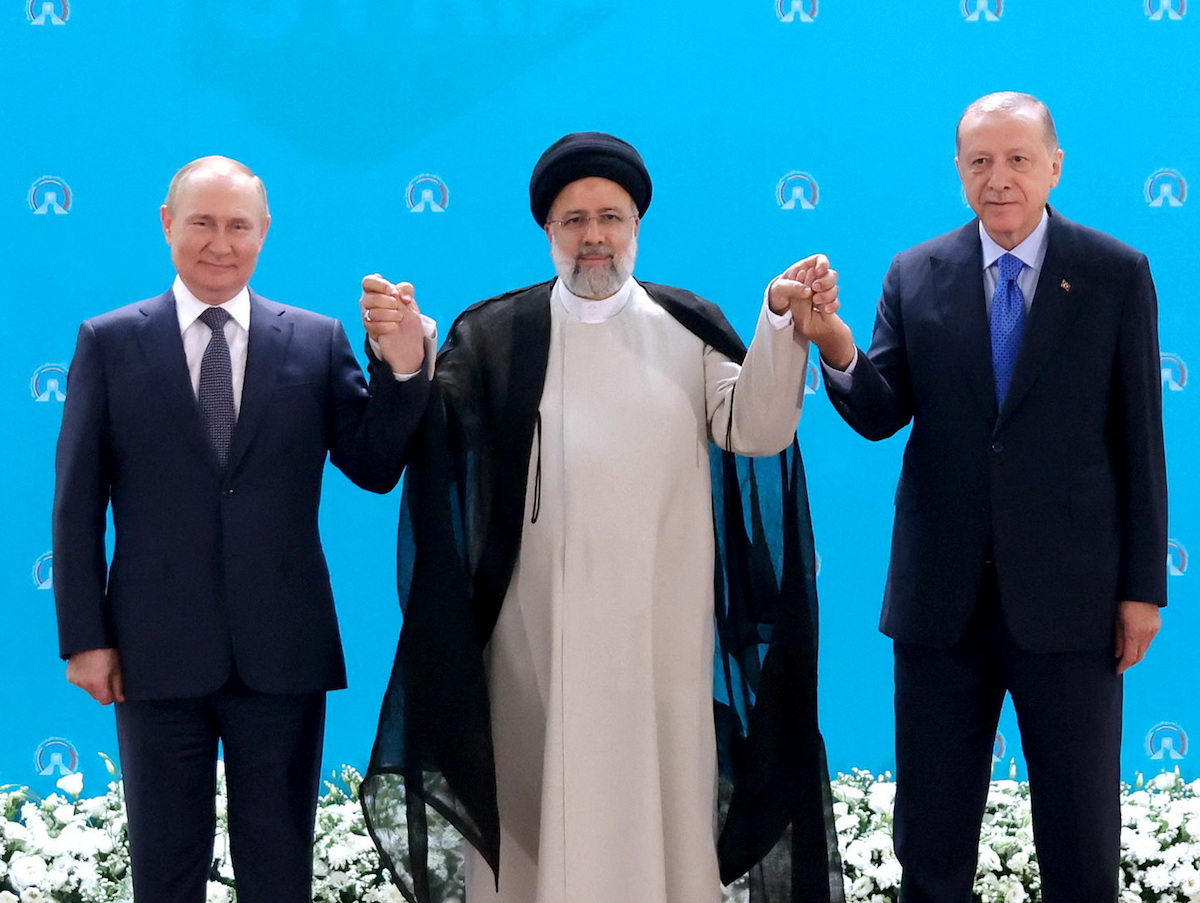
Economic leverage: Turkey's strategic economic position
Turkey's economic position adds another layer of complexity to NATO's dilemma. With the 18th largest economy globally and a GDP exceeding $1.1 trillion, Turkey represents a significant economic force that straddles Europe, Asia, and the Middle East. The country's strategic position in global supply chains and energy transit routes makes it an indispensable economic partner for both Western allies and competitors.
Turkey has skillfully leveraged this economic position to pursue its political objectives. Its control over critical energy infrastructure, including the TurkStream pipeline and potential gas discoveries in the Eastern Mediterranean, gives it significant influence over European energy security.
Meanwhile, its expanding trade relationships with Russia (reaching $60 billion in 2022) and growing economic ties with China demonstrate its ability to balance between competing power blocs.
The Turkish economy's integration with European markets - the EU remains Turkey's largest trading partner - creates a web of mutual dependencies that complicates any potential Western response to Turkey's behavior. European businesses have significant investments in Turkey, while Turkish companies play crucial roles in European supply chains.
This economic interdependence, combined with Turkey's role in managing refugee flows and its military capabilities, creates a powerful deterrent against meaningful Western sanctions or punitive measures.
The Israel Paradox: From Strategic Partner to Adversary
Turkey's relationship with Israel illustrates the dramatic shift in its strategic orientation. During the 1990s, Turkey and Israel maintained a robust military partnership, including joint military exercises and defense cooperation agreements. This alliance, anchored in shared regional threats, particularly from Syria, and Turkey's then-Western-oriented military establishment, has devolved into open hostility.
The relationship began deteriorating after Operation Cast Lead in Gaza (2008-9) and reached its lowest point following the 2010 Mavi Marmara flotilla incident. Despite periodic attempts at reconciliation, including a significant warming of relations in 2022 marked by Israeli President Herzog's visit to Turkey and a September 2023 meeting between Netanyahu and Erdoğan at the UN, the relationship has collapsed entirely.
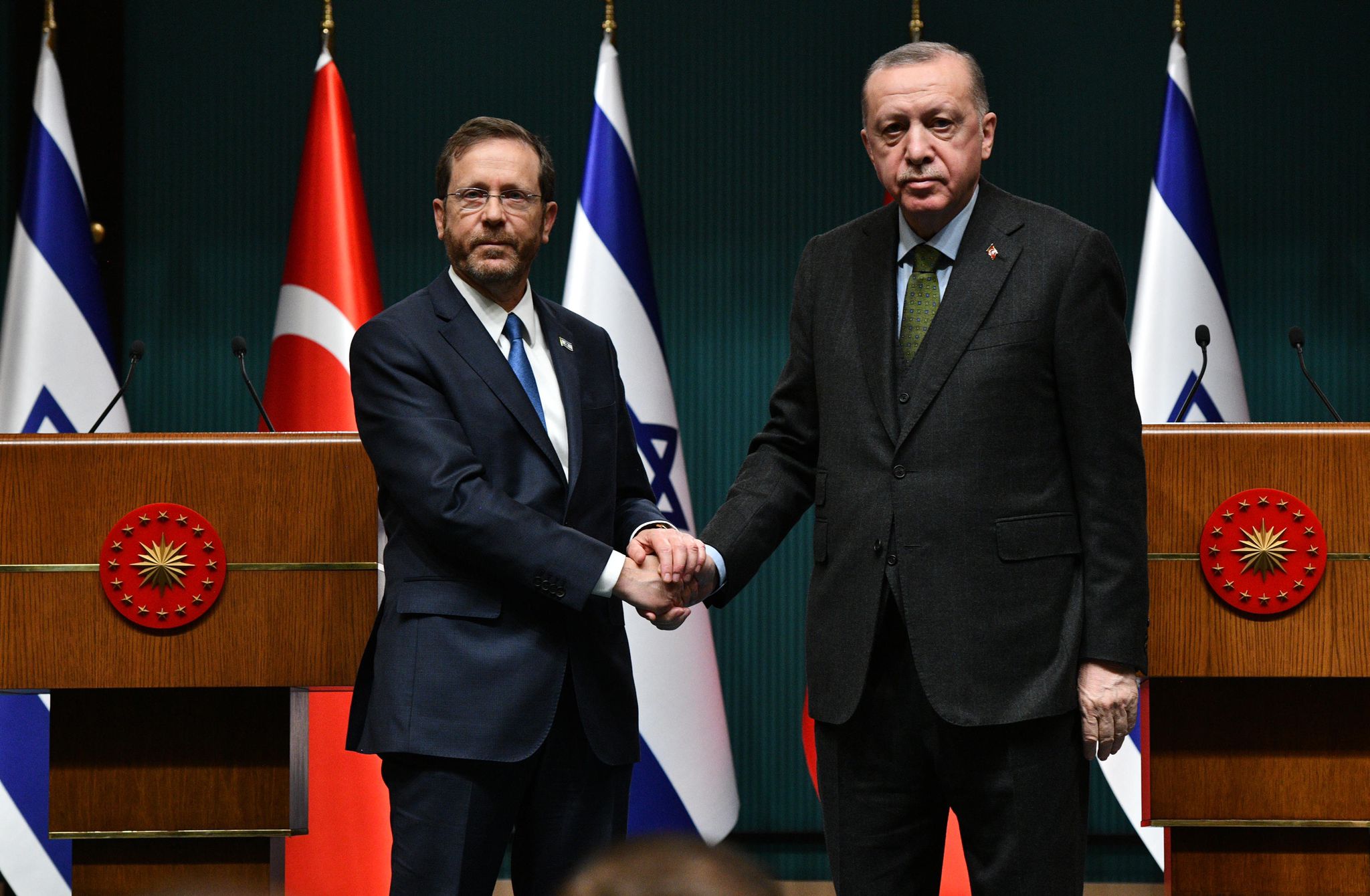
Following Hamas' October 7 attack, Erdoğan's response marked a point of no return - initially calling for restraint from both sides before shifting to openly praising Hamas as "mujahedeen" and denouncing Israel as a "war criminal state."
This rhetoric led to unprecedented actions: Turkey officially severed all diplomatic ties with Israel in November 2024, with Erdoğan declaring Turkey's association with Israel "nonexistent." The rupture extended beyond diplomacy into economics, with Turkey removing Israel from its export target list and implementing strict trade restrictions.
The Turkish leader has further escalated the situation by leading international initiatives against Israel, including pushing for an arms embargo at the United Nations. This complete breakdown in relations represents the culmination of Turkey's transformation from strategic partner to outright adversary, reflecting both Erdoğan's ideological, political and even theological commitments and Turkey's broader strategic realignment away from Western allies.
The NATO dilemma and global implications
Turkey's transformation presents NATO with an unprecedented challenge: a member state actively supporting a designated terrorist organization while pursuing policies that often contradict alliance interests. Yet Turkey faces minimal consequences, protected by its irreplaceable strategic position and military capabilities.
This situation threatens the credibility of the international order. As Turkey continues to leverage its position between East and West, supporting groups like Hamas while maintaining NATO membership, it creates a dangerous precedent.
The failure to address Turkey's behavior raises fundamental questions about the ability of Western institutions to maintain consistent standards and cope with members who systematically violate core principles.
The implications extend far beyond regional politics. Turkey's case demonstrates how a NATO member can systematically support designated terrorist organizations while using its strategic position to deter meaningful consequences.
As Turkey continues its trajectory toward authoritarian Islamic governance while maintaining its NATO status, it challenges fundamental assumptions about the coherence and effectiveness of post-war security architecture.
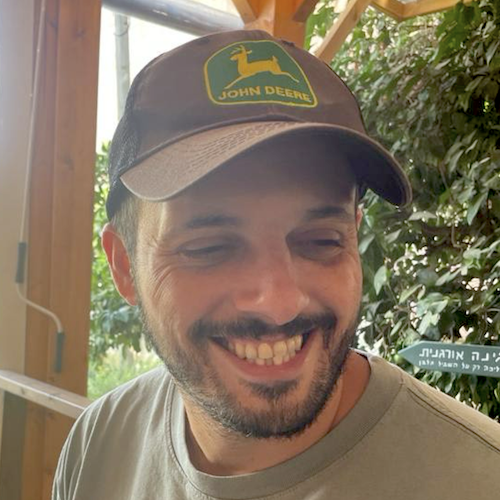
Tolik is a Middle East analyst and media professional with extensive experience in covering regional geopolitical developments. His background spans analytical journalism, media production, and strategic communications, having contributed to major Israeli and international television networks and newspapers.










